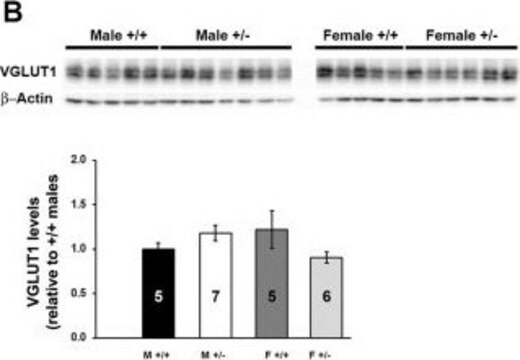AMAB91041
Monoclonal Anti-VGLUT1 antibody produced in mouse

Prestige Antibodies® Powered by Atlas Antibodies, clone CL2754, purified immunoglobulin, buffered aqueous glycerol solution
Synonym(s):
BNPI, SLC17A7
About This Item
Recommended Products
biological source
mouse
Quality Level
conjugate
unconjugated
antibody form
purified immunoglobulin
antibody product type
primary antibodies
clone
CL2754, monoclonal
product line
Prestige Antibodies® Powered by Atlas Antibodies
form
buffered aqueous glycerol solution
species reactivity
mouse, human, rat
enhanced validation
orthogonal RNAseq
Learn more about Antibody Enhanced Validation
technique(s)
immunoblotting: 1 μg/mL
immunohistochemistry: 1:5000- 1:10000
isotype
IgG2b
immunogen sequence
PSISEEERKYIEDAIGESAKLMNPLTKFSTP
shipped in
wet ice
storage temp.
−20°C
target post-translational modification
unmodified
Gene Information
human ... VGLUT1(57030)
General description
(SLC17A7), is encoded by the gene mapped to human chromosome 19q13, a region associated with schizophrenia. VGLUT1 is specifically expressed in neuronal cells in the brain and at higher level in neuron-enriched regions such as the amygdala and hippocampus. Glia-enriched areas such as the corpus callosum also show moderate level of expression and substantia nigra, subthalamic nuclei and thalamus show low level expression. VGLUT1 is characterized with a conserved C-terminal dileucine-like motif and two polyproline domains distal to C- terminal end, including one that binds to endocytic BAR (Bin/Amphiphysin/Rvs) domain protein, endophilin.
Immunogen
Application
The Human Protein Atlas project can be subdivided into three efforts: Human Tissue Atlas, Cancer Atlas, and Human Cell Atlas. The antibodies that have been generated in support of the Tissue and Cancer Atlas projects have been tested by immunohistochemistry against hundreds of normal and disease tissues and through the recent efforts of the Human Cell Atlas project, many have been characterized by immunofluorescence to map the human proteome not only at the tissue level but now at the subcellular level. These images and the collection of this vast data set can be viewed on the Human Protein Atlas (HPA) site by clicking on the Image Gallery link. We also provide Prestige Antibodies® protocols and other useful information.
Biochem/physiol Actions
Features and Benefits
Every Prestige Antibody is tested in the following ways:
- IHC tissue array of 44 normal human tissues and 20 of the most common cancer type tissues.
- Protein array of 364 human recombinant protein fragments.
Linkage
Physical form
Legal Information
Disclaimer
Not finding the right product?
Try our Product Selector Tool.
recommended
Storage Class Code
10 - Combustible liquids
WGK
WGK 1
Certificates of Analysis (COA)
Search for Certificates of Analysis (COA) by entering the products Lot/Batch Number. Lot and Batch Numbers can be found on a product’s label following the words ‘Lot’ or ‘Batch’.
Already Own This Product?
Find documentation for the products that you have recently purchased in the Document Library.
Customers Also Viewed
Our team of scientists has experience in all areas of research including Life Science, Material Science, Chemical Synthesis, Chromatography, Analytical and many others.
Contact Technical Service









